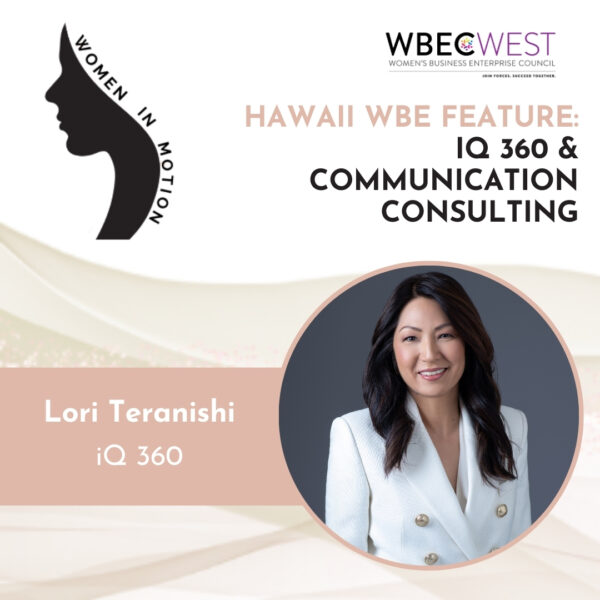
In a recent conversation with Lee Kantor, Lori Teranishi, the dynamic leader of iQ 360, shared her unique approach to business advisory and communications consulting. This post delves into their discussion, exploring the innovative strategies employed by iQ 360 to help companies navigate complex crises, strategic transformations, and more.
A Unique Blend of Expertise
Lori Teranishi began by highlighting what sets iQ 360 apart from traditional PR firms. “We are a unique entity in our field,” she explained. “We like to think of ourselves as a mix of a business advisory firm and communications consulting, which is a little unusual in our industry.” iQ 360’s team comprises former chief communications officers, MBAs, attorneys, and product managers, bringing a wealth of experience to the table.
This diverse expertise allows iQ 360 to manage a wide range of complex situations, including crises, litigation, mergers and acquisitions, and large-scale organizational transformations. “We often find ourselves advising on strategy and operations as well as communications because the way we communicate to multiple stakeholders often involves making business decisions,” Lori noted.
The Importance of Values
When embarking on any major change or facing a crisis, iQ 360 starts with the company’s core values. “It’s always important that a company have its purpose and values laid out so that that becomes its North Star,” Lori emphasized. This guiding principle ensures that all business decisions and communications are aligned with the company’s fundamental beliefs.
Lee Kantor pointed out that many companies might have mission statements that no longer reflect their current reality. Lori acknowledged this issue, noting that strategic plans and mission statements often sit on a shelf, gathering dust. “Because the world is changing so quickly, it’s no longer enough to write a strategic plan and keep it for five years without revisiting it,” she said. Companies must be more adaptable and agile than ever before.
Maintaining a True North
The conversation turned to whether it’s possible for organizations to maintain a single guiding principle amidst rapid technological and market changes. Lori believes it is not only possible but essential. “In addition to the complexity of the world, businesses have a complexity of stakeholders that they manage,” she explained. This includes employees, regulators, supply chains, business partners, activists, investors, and customers.
In such a complex environment, having a North Star provides a litmus test for difficult decisions involving trade-offs between different stakeholders. “If you don’t have that, you run the risk of getting pulled in many directions and not being able to stand for something,” Lori said.
Defining and Realigning Values
Lori shared practical advice for organizations looking to define or realign their core values. She emphasized the importance of getting input from a cross-section of stakeholders, including employees, business partners, and customers. “If you feel as a company or organization that you’ve lost your way, you have to start with defining your mission and values,” she advised.
iQ 360 often helps companies identify the root causes of their problems, which may go beyond communication issues to underlying business strategy challenges. “It’s important to get a more unbiased view of things,” Lori said, highlighting the benefits of bringing in a third party like iQ 360.
The Critical Role of Culture
Lee Kantor stressed the importance of having everyone in an organization understand and embrace its mission, vision, and culture. Lori agreed, noting that many businesses treat these elements as checkboxes rather than integral parts of their operations. “If no one is using the strategic plan or embracing the values, what good is it really?” she asked.
As businesses grow, it’s essential to train leaders to communicate the culture, vision, and values effectively. “You have to train your leaders to talk about the culture and to be good communicators and stewards of that vision and culture,” Lori emphasized. This is especially crucial in a VUCA world—characterized by volatility, uncertainty, complexity, and ambiguity—where managing risk and reputation across multiple stakeholders is more critical than ever.
Adapting to a Changing World
In today’s digital world, human capital is the focus, and managing risk and reputation is paramount. Lori highlighted the need for leaders to think multi-dimensionally and understand that perceptions about their business are as critical as their products and services.
The Value of Community
Lori also shared the benefits of being part of WBEC-West, a community of Women Business Owners. “It’s very lonely at times, being a founder and running a business,” she admitted. Being part of a community where she can learn from others facing similar challenges has been invaluable.
Finding the Right Clients and Talent
iQ 360 tends to work with companies that value strategic communication at the highest levels. “We come in where there are ‘bet the farm’ issues at stake, or a company wants to make a big transformation,” Lori explained. The firm is always looking for both new talent and clients who appreciate the power of strategic communication.
In closing, Lori reiterated the importance of aligning business decisions with core values and maintaining a strong culture. “Keeping your employees focused and aligned with the culture is probably the most important thing you as a leader can do,” she said. As businesses navigate an increasingly complex world, iQ 360’s unique blend of business advisory and communications consulting provides a powerful tool for driving success.
For more information or to have a more substantive conversation with Lori Teranishi or her team, visit www.iq360inc.com. To listen to her full story, click this link: https://businessradiox.com/podcast/women-in-motion/iq-360/
About Women’s Business Enterprise Council-West (WBEC-West)
WBEC-West is a regional partner of the Women’s Business Enterprise National Council (WBENC), a coalition of corporations, WBEs, and regionally focused women’s business organizations. As an affiliate organization, WBEC-West implements the certification standards of WBENC throughout Arizona, Colorado, Southern California, Utah, Wyoming, Nevada, Hawaii, and Guam. WBENC is the largest certifier of women’s business enterprises in the U.S. and a leading advocate for women business owners, leaders, and entrepreneurs. WBENC certification is nationally recognized and accepted by more than 10,000 major corporations. We also support corporations in their efforts to include WBENC Certified WBEs in their supply chain.





